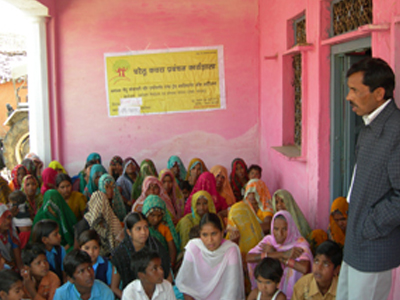Home / All Socio-economic Activities / Campaign on right disposal of household garbage and keeping the surroundings clean: ‘Solid Waste Management’
(Date: March 5, 2012)
Venue: Chuk Phatak, Tekanpur, Gwalior
SETU in association with the Environmental Planning & Coordination Organization (EPCO) organized a campaign on “Right disposal of household garbage and keeping the surroundings clean and hygienic)” at ‘Chuk Phatak,Tekanpur’, a local area in the city.
The campaign was set up with an objective of enlightening the local population about different types of wastes, proper waste disposal, pollution and its direct ill effects on environment and on their lives. The awareness level of the crowd on cleanliness was found to be quite low, therefore, our speakers enlightened the crowd on various key points including the harmful effects of improper waste disposal & unclean surroundings. Keeping their home surroundings & local periphery clean as far as possible and many more related points were also discussed with the participants.
Customary bad habits were pointed out, some of them in brief are as under:-
1) Garbage dumping: throwing garbage anywhere without caring that people might step on it. It also attracts flies and mosquitoes further spreading diseases.
2) Defecation & Urination: We throw the animal and human excreta in the open, spoiling the cleanliness, creating foul smell along with portraying a bad picture of our nation.
3) Spitting: Another bad habit seen in people is spitting anywhere.
4) Not maintaining self-cleanliness and hygiene.
How can we make our surroundings clean? Following points were discussed:
a) Defecate in a sanitary latrine and using enough water to throw into it keeping them neat and clean
b) People can get together and build a common latrine.
c) We can also make water-sealed pit latrines away from the source of drinking water and residential areas.
d) We can also make other toilets such as `Suvidha’ & ‘Sulabh Shochalaya’ at public places.
e) Using of dustbins and dustbins only.
f) If there are no toilets, then the place for defecations in the open must be selected which should be away from human habitation and from the source of drinking water. The stools should be covered with sand or soil to prevent the spread of germs.
g) After defecations hands and feet should be washed with soap and clean water also take regular baths to maintain self-hygiene.
h) Keep the food and drinking items always covered

Special focus was given on solid waste management:
Disposal of wastes into:
1) Degradable waste (dry waste & wet wastes)
2) Non-degradable waste.
Degradable waste can be further segregated & used to feed animals & as humus for plants and non-degradable waste can be recycled where possible. This can be done by putting two bins separately and segregating the garbage respectively.
The participants were also educated on RCH issues like:
– What type of Nutrition is needed & how to avail the best
– Free distribution of iron tablets among young girls & women
– Family planning
– How to avail best quality treatment at reasonable prices
– Vaccination for safe motherhood
– Vaccination of children for lifelong immunity.
The session also included an interactive ‘One Minute Competition’ for the crowd where the first to collect & segregate the garbage correctly was the winner of the competition.
SETU distributed cleaning tools (dustbins, disinfectants & broomsticks) to the participants. A small yet broad demonstration was made to the crowd explaining the effective use of the tools distributed to them. Pamphlets/flyers were also distributed which covered all the related information for their study & follow-up in future. The reaction from the participants seemed positive and enthusiastic. They also contributed with more ideas of their own to address the issue.